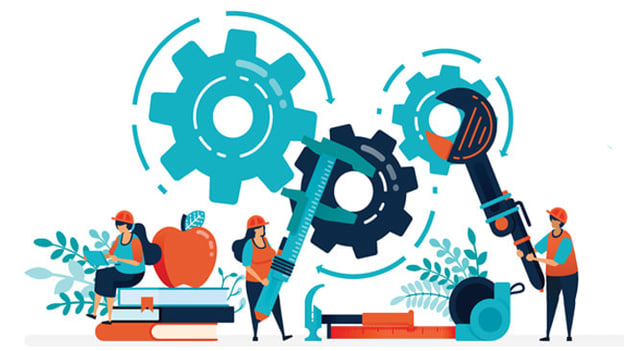Redesigning skill programmes is the need of the hour

The dynamic nature of businesses across sectors warrants a robust talent management programme. While talent acquisition solves an organisation’s requirements to a certain extent, skill training of existing resources is a relatively cost-effective way to bridge the gap. Reskilling and upskilling can prove to be a game-changer in an organisation’s growth story. However, the organisation’s approach to training and development programmes also plays a significant role. Skilling to be future-ready is recommended over scouting the market to match requirements. The pandemic has reinforced the need for skill development. The fundamental shifts brought on by the pandemic can be equated to the massive requirement of skill development at the beginning of industrialisation.
Before COVID-19, ‘talent risk’ was far behind on the list of risks to long-term growth in KPMG’s CEO Outlook Survey. In its 2020 report, talent risk has risen to become the number one threat. Another post-COVID-19 KPMG report suggests that 62 per cent of the CIOs believe that skill shortage has prevented their company from keeping up with the pace of change.
Among the several lessons that the COVID-19 outbreak has taught us, the most important learning for organisations is being future-ready. It also taught us that long-term planning can become obsolete within days, resulting in massive losses. Organisations that had invested in digital technology before the pandemic reaped the most benefits in addition to a quick and easy transition.
Survival of the skilled
The Darwinian theory of ‘survival of the fittest’ applies to the present-day professional world. An employee who is skilled and can multi-task will be able to manage additional responsibilities becoming an asset for the company. Those who are slow to upgrade would sooner or later become redundant for the organisation.
Digital and automation skills have become a dire necessity. Those who lost jobs during the pandemic and did not upgrade themselves are finding it difficult to get a new job. With each passing day, more organisations are restructuring their operations by adopting digital tools and switching to automation. There is a growing need for people who are skilled to develop and implement these new technologies.
Igniting the spirit to upskill
Developing skills of in-house resources is an uphill task for organisations with the pandemic still around. While 72 per cent of the human resource managers consider reskilling and upskilling to be one of the most important paths to shape the workforce, only 33 per cent think it will be easy to implement. Developing innovative remote reskilling programmes and igniting employee spirit to reskill is pertinent for organisations to become future-ready.
Companies need to rely on data rather than speculation to understand the pain points of employees. They must devise sector-specific solutions that enable employees to perform better. Implementing performance-enhancing technologies will help to develop a versatile workforce. Versatility is key to learning new practices that will help companies and employees to surge ahead in a digital world. Identifying and using precise tools for project management and communication will also make a significant difference.
The need to step up
The leadership must turn into learning facilitators to lead the change across levels and functions. They need to encourage employees who demonstrate cross-functional expertise. These employees can perform better in a collaborative work environment.
Leaders need to identify the skill gap and drive training programmes accordingly. While beginners and young professionals will need upskilling, experienced employees would require reskilling to ensure their skill sets do not become obsolete.
It has become pertinent to provide the right skill sets to employees irrespective of their designations. It equips them to manage work across departments and engage with external agencies. While those working in junior profiles can operate with limited understanding, those in senior roles need to be aware of most of the technological advancements to monitor operations effectively.
The Accenture Future of Work Study 2021 suggests that more than 63 per cent of high-growth companies have already adopted a “productivity anywhere” workforce model. To perform their tasks efficiently, the team members of these organisations need upskilling and reskilling at the earliest. The training given at the beginning of the pandemic was an emergency measure to manage the new normal. Now, new training modules need to be developed for systematic and continuous training of employees. Redesigning skill programmes is the need of the hour and every organisation must embark on the process.
















